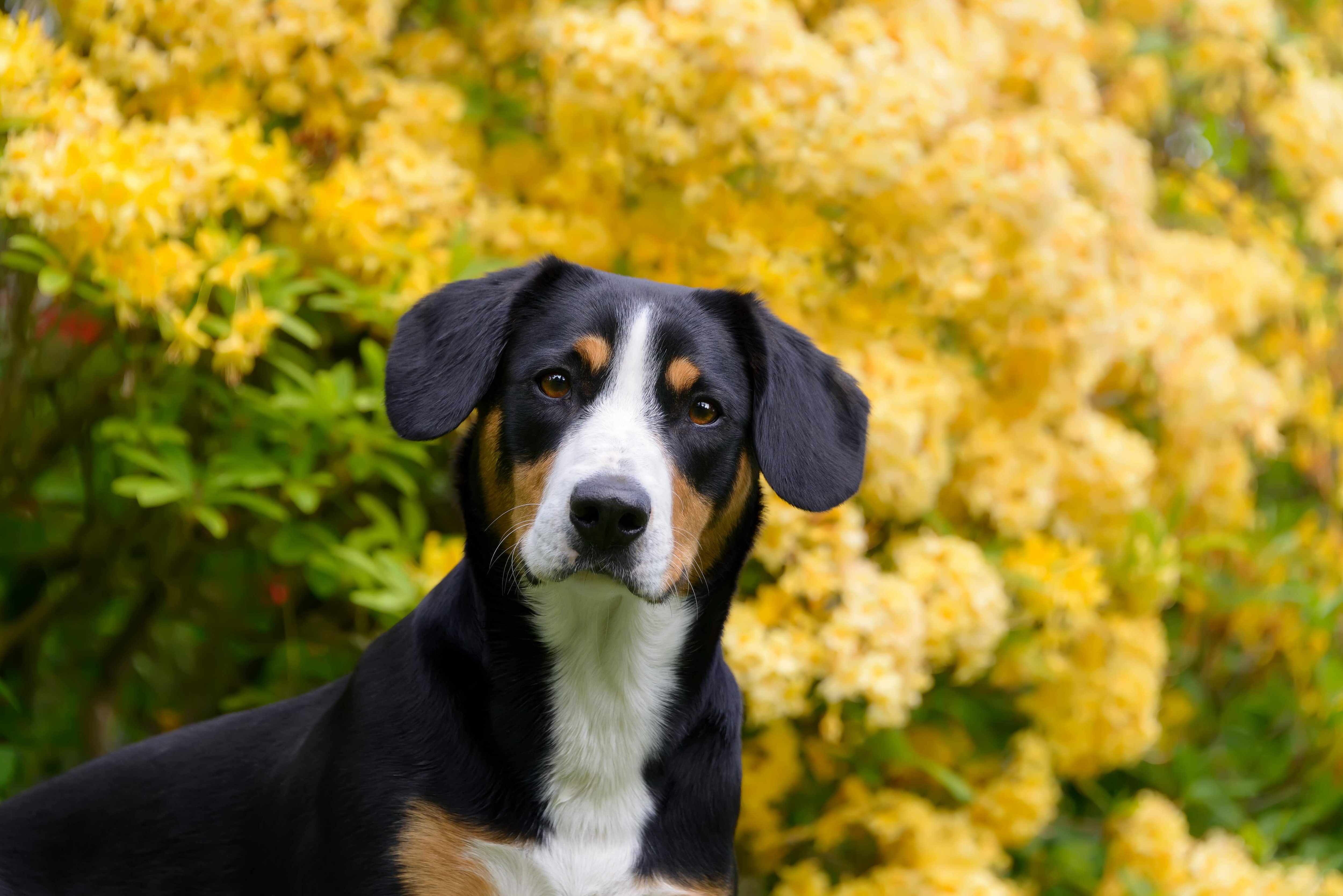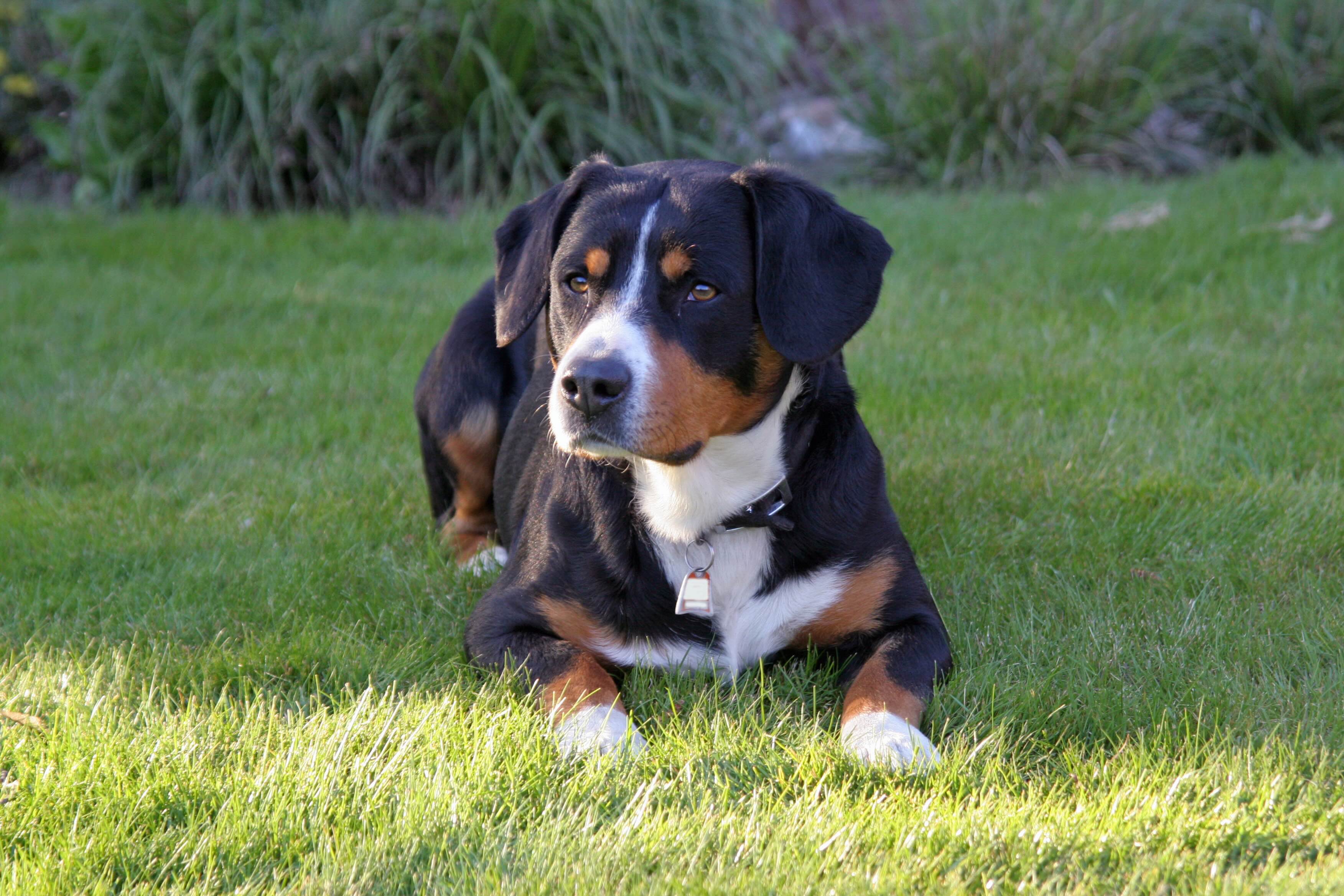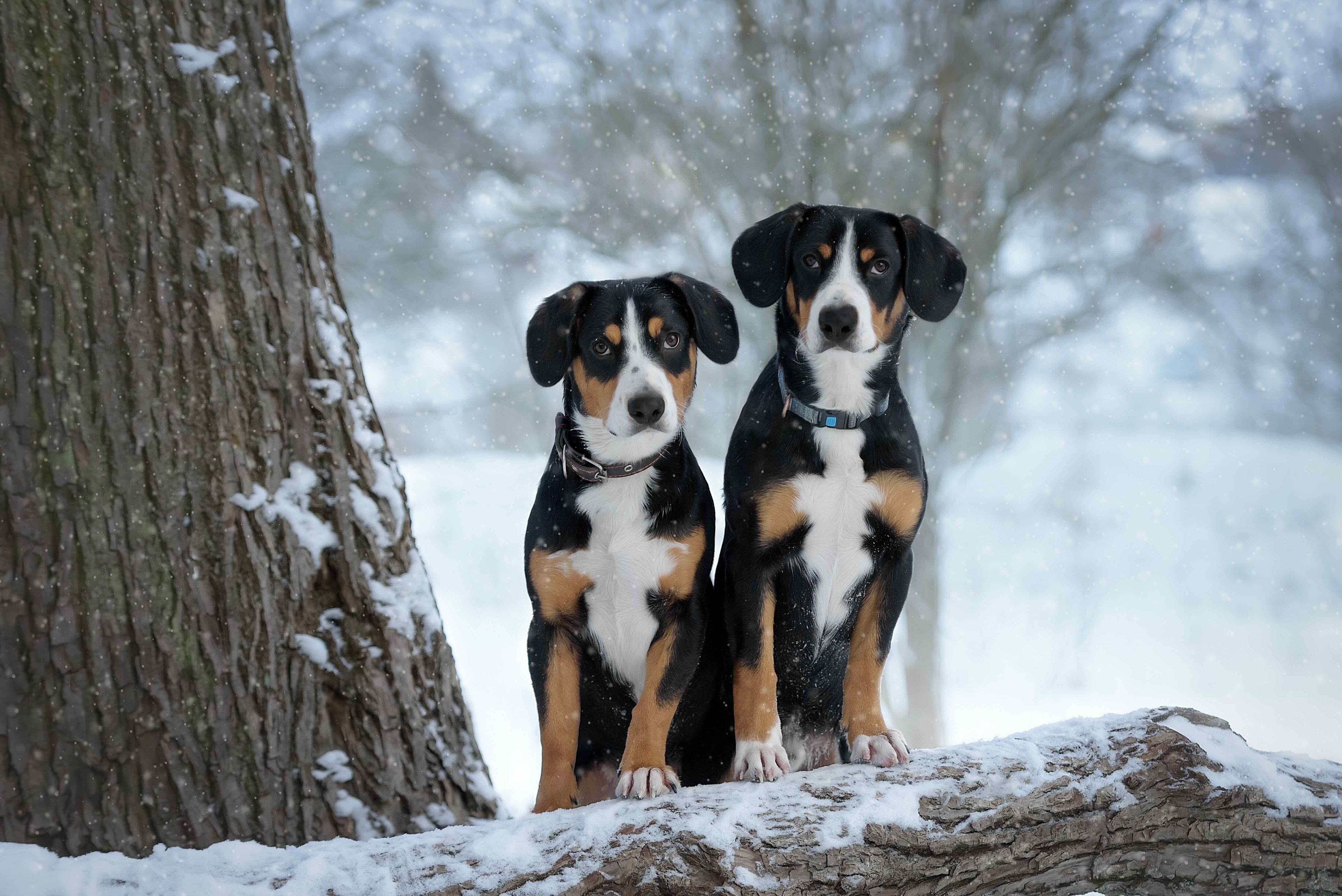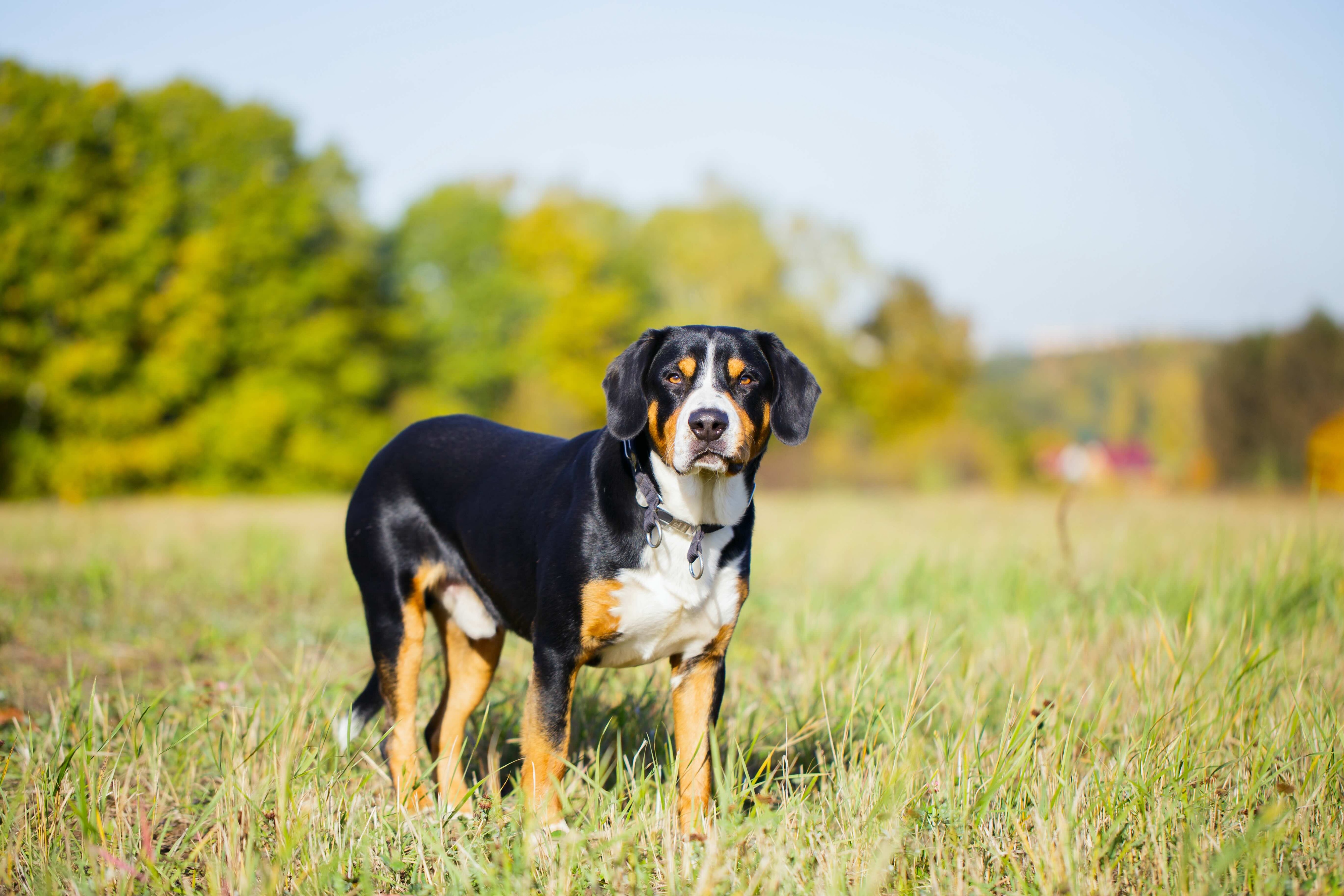Entlebucher Mountain Dog
Adobe Stock/Alexander
Entlebucher Mountain Dogs date back to the late 1800s in Switzerland. They were bred as cattle herders up high in the Swiss Alps, and often kept cattle safe on the rocky terrain as they trotted up or down. They are known for their tri-colored coat and larger-than-life personality.
A medium-sized dog, the Entlebucher is known as the smallest of the Swiss dog breeds, and can stand up to 21 inches tall and weigh up to 65 pounds.
Caring for an Entlebucher Mountain Dog
Entlebucher Mountain Dogs are smart working dogs that need physical exercise and mental stimulation to be happy.
They love to be involved in whatever their pet parents are doing and are deeply devoted to their family. However, thanks to their working history, this breed may need some time to warm up to strangers. Early socialization and positive reinforcement–based training are a must for Entlebucher Mountain Dog puppies.
Entlebucher Mountain Dog Health Issues

The Entlebucher Mountain Dog lifespan is 11–13 years. They tend to be a healthy dog breed, but they can be predisposed to some common health issues. Pet insurance may be a good investment for a family looking to bring home an Entlebucher Mountain Dog puppy.
Hip Dysplasia
Hip dysplasia is when the hip joint doesn’t develop properly, resulting in a loose joint. This can be influenced by growth rate, hormones, diet, and/or exercise.
Hip dysplasia can cause degenerative joint disease and osteoarthritis to develop, leading to pain, limping, and difficulty standing.
Keeping your dog at a healthy weight is important for preventing arthritis. Many vets recommend low-intensity exercise, omega-3 fatty acids (fish oil), and/or joint supplements containing glucosamine and chondroitin for dogs diagnosed with hip dysplasia. In severe cases, your vet might need to perform surgery to correct the hip dysplasia.
Patella Luxation
Patella luxation is when the kneecap slips out of place (luxates) to either side of the kneecap as a dog walks or runs. Mild cases may only be noticed by your veterinarian during a physical exam, while more severe cases are seen at home as a bunny-hopping gait, limping, and a bowlegged stance in your dog.
Patella luxation is often addressed medically with joint supplements and weight management. Severe cases may need surgery.
Progressive Retinal Atrophy
Progressive retinal atrophy (PRA) is a term for a group of degenerative eye diseases that affect the layers of the eye responsible for vision. PRA is not curable, and eventually the condition results in blindness.
But PRA isn’t a painful condition for dogs, and blind dogs can live long and happy lives with help from their pet parents.
Talk to your veterinarian if you notice changes in your dog’s eyes or eyesight, such as:
-
Increased clumsiness (bumping into things)
-
Reluctance to go outside at night
-
Dilated pupils
What To Feed an Entlebucher Mountain Dog

All dogs, including the Swiss Entlebucher Mountain Dog, need to eat a food that meets Association of American Feed Control Officials (AAFCO) nutritional standards. This ensures your dog receives a complete and balanced diet that’s appropriate for their life stage and size.
Growing Entlebucher Mountain Dog puppies should be fed a standard puppy food until they reach maturity at approximately 12–16 months old. Feed your pup three or four meals a day on a consistent schedule.
Once they reach their full adult size, slowly transition your Entlebucher to a high-quality adult diet. Working dogs or those with exceptionally high energy may benefit from a performance diet.
Talk to your vet about choosing the best dog food for your pet. Popular brands include Hill’s®, Royal Canin®, and Purina®.
How To Feed an Entlebucher Mountain Dog
Feed your Entlebucher Mountain Dog twice a day on a regular schedule. Puppies may need to eat more frequently, up to four times every day. Talk to your veterinarian to see what they recommend for your specific dog.
Some Entlebucher Mountain Dogs may be prone to eating too fast. For these dogs, consider a slow-feeder bowl or food puzzle to help them slow down and prevent gastrointestinal upset. This will also provide much-needed mental stimulation.
How Much Should You Feed an Entlebucher Mountain Dog?
How much you feed an Entlebucher Mountain Dog depends on their life stage, body condition score, activity level, health, spay or neuter status, and the brand and type of food you’re offering.
Talk to your vet for the best portion advice.
Nutritional Tips for Entlebucher Mountain Dogs
Dogs eating an AAFCO-compliant diet typically receive all the nutrients they need.
However, your vet may recommend a dog-friendly supplement to fill any nutritional gaps and help prevent or reduce the impact of certain health issues. For example, joint supplements may be recommended for Entlebucher Mountain Dogs with hip dysplasia or patellar luxation.
Never give your dog a supplement without speaking with a vet first.
Behavior and Training Tips for Entlebucher Mountain Dogs
Entlebucher Mountain Dog Personality and Temperament

Entlebucher Mountain Dogs are loyal, smart dogs with a fun-loving personality—they’re even sometimes called the “laughing dogs” of the Swiss Alps. They are affectionate with their family, but they might need time to warm up to strangers.
As with all dog breeds, early socialization is important. Entlebuchers can be good with children, cats, and other dogs as long as they are well socialized from puppyhood.
Entlebucher Mountain Dog Behavior
Entlebucher Mountain Dogs need both physical and mental exercise to curb boredom and unwanted behaviors (such as digging, chewing, and excessive barking) and to channel their excess energy. They also love a challenge, like solving puzzles.
As working dogs, they also enjoy keeping close to their families and following along with whatever they’re doing. But know that their innate herding tendencies may still result in their attempting to herd other small animals and children if this behavior is not redirected.
Entlebucher Mountain Dog Training
Entlebucher Mountain Dogs are eager to please and highly motivated, which can make training easy. They respond best to positive reinforcement.
They can get bored easily, however, so it’s important to vary your training methods and keep your dog mentally stimulated.
Fun Activities for Entlebucher Mountain Dogs
Entlebucher Mountain Dog Grooming Guide

When it comes to grooming, Entlebucher Mountain Dogs are low-maintenance because their short hair doesn’t require frequent trimming or professional grooming.
However, they shed regularly throughout the year and go through heavier shedding periods during the spring and fall. Consider brushing your dog a few times a week; not only will this help remove loose hair, but regular brushing also distributes skin oils and keeps their coat looking healthy.
Skin Care
Entlebucher Mountain Dogs typically don’t require special skin care, and their coat provides natural protection for their skin.
However, like all dogs, Entlebuchers can develop skin infections and other issues. If you notice excessive licking, redness, swelling, or flaking skin, contact your veterinarian for an exam.
Coat Care
While Entlebuchers don’t need as much grooming as other, fluffier dog breeds, they should be brushed regularly to remove loose hair and dirt. Brush your dog once a week or every two weeks; you can increase the frequency if your pup sheds a lot.
Entlebuchers don’t need frequent baths, but bathe your dog as needed to keep them clean.
Eye Care
Routine cleaning with a soft, damp cloth will help prevent normal tearing and debris from building up around your Entlebucher’s eyes. Contact a vet if you notice changes in your dog’s eyes or vision, as these could be signs of PRA or another health condition.
Ear Care
Routine cleaning with a veterinary-approved ear cleanser is vital in maintaining your Entlebucher’s healthy ear canals. Be alert for signs of an ear infection, and contact your vet if odor, redness, or discharge is noticed.
Considerations for Pet Parents
Entlebucher Mountain Dogs are a joy to have around; they are fun-loving, enthusiastic, playful, loyal companions. But because of their original purpose—herding and guiding cattle in the Swiss Alps—they are considered working dogs that love having a job. This means they have higher-than-average exercise needs (at least one hour of running, hiking, or biking) and plenty of mental stimulation.
They will do best in a home with pet parents who can give them this time and attention. But they are highly motivated, ready to train, and friendly when socialized early.
Entlebucher Mountain Dog FAQs
Are Entlebucher Mountain Dogs good pets?
Yes. When well trained and socialized, Entlebuchers make great family pets that get along with other animals and children.
Do Entlebucher Mountain Dogs bark a lot?
No, Entlebucher Mountain Dogs are not usually frequent barkers. They alert when something is happening, but nuisance barking is unlikely to be a problem with this breed—unless they aren’t receiving the physical and mental exercise they need.
What’s the difference between Entlebuchers and Swiss Mountain Dogs?
Entlebucher Mountain Dogs and Greater Swiss Mountain Dogs share a common ancestor, along with two other breeds: the Appenzeller and the Bernese Mountain Dog. Though they share similar coloring, Greater Swiss Mountain Dogs are much larger (they can weigh up to 110 pounds). Entlebuchers are the smallest of the Swiss dog breeds, weighing 40–65 pounds.
